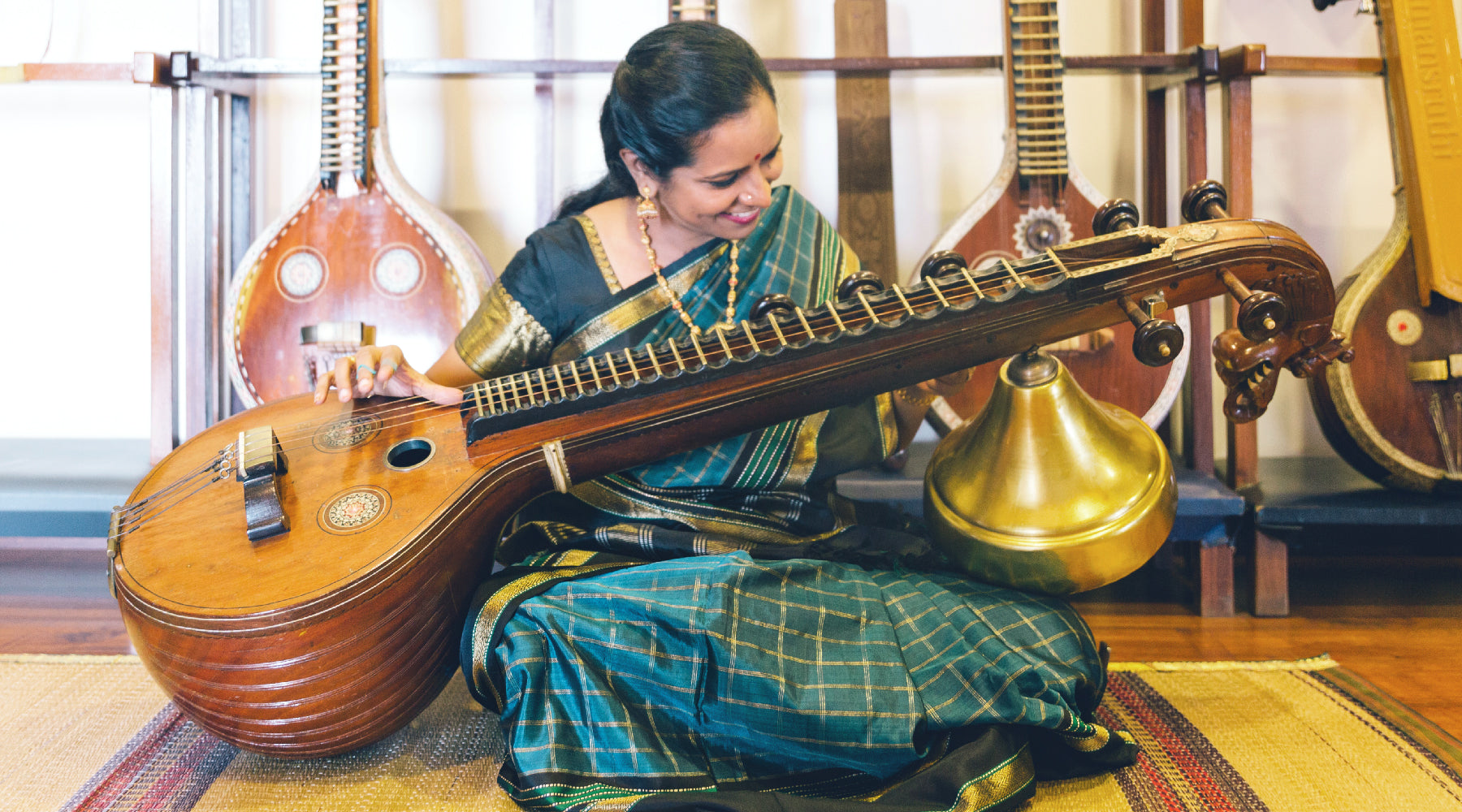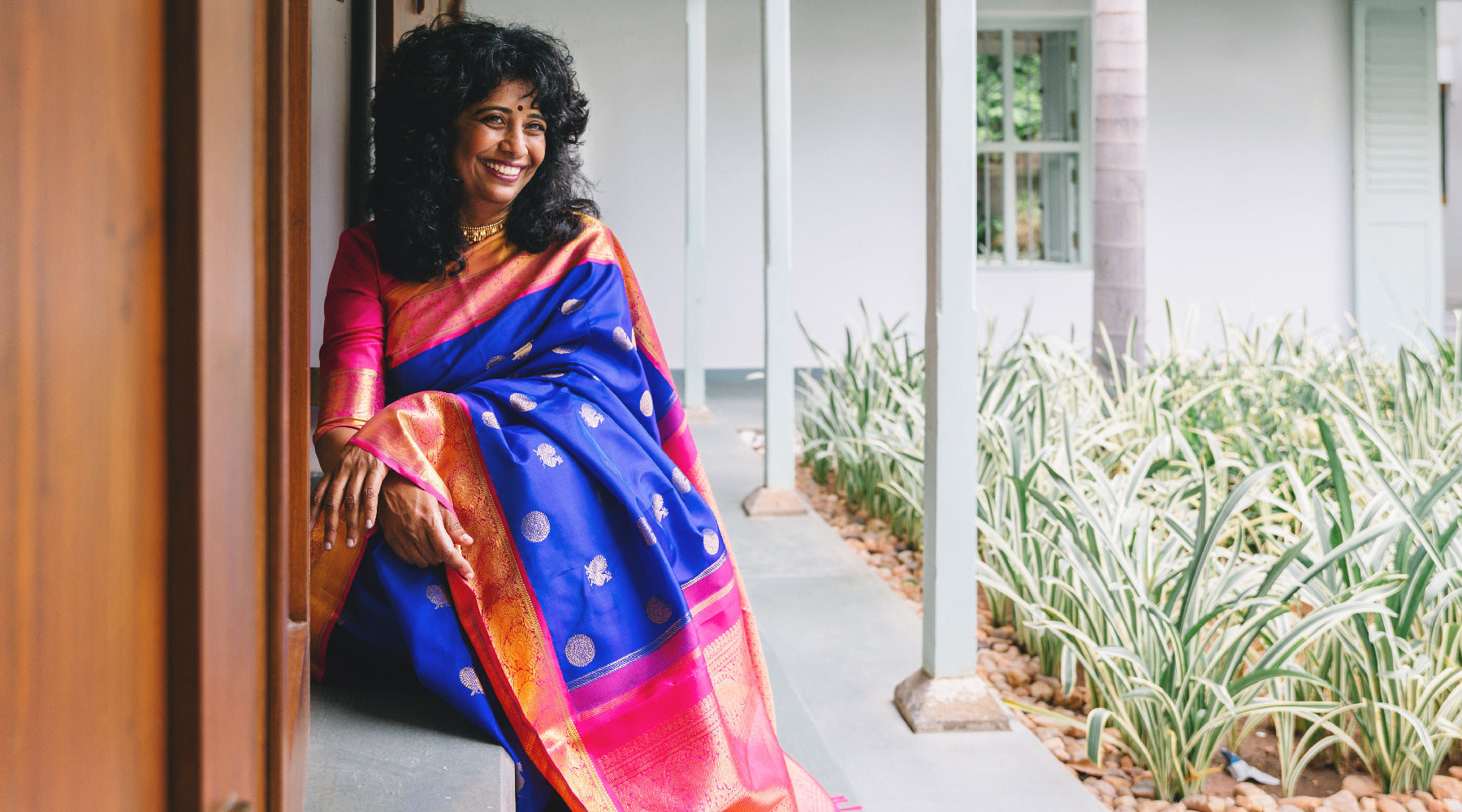KANAKAVALLI VIGNETTES : Vandana Gopikumar - In Pursuit Of Truth

Dr. Vandana Gopikumar is the Co-founder of The Banyan, a pioneering organisation in the field of mental health in India that turns 25 this year. In Kanakavalli’s August Vignettes, Vandana traces the roots of her passion to make a difference, the early years of struggling against stereotype and the person-centred approach that makes The Banyan truly special. While sharing her vision for the future of mental health care in India with Aneesha Bangera of the Kanakavalli Journal, Vandana emphasises her conviction that beauty lies in being authentic and true to yourself, and that finding purpose is central to living a full life. The Banyan is a people’s movement, one born out of the belief that we can sometimes choose our family, and that in celebrating difference and diversity there is great joy, perspective-shaping and learning. Taking time out of a schedule of engaging in clinical work with clients at The Banyan, writing, researching and teaching at The Banyan Academy of Leadership in Mental Health and at the Tata Institute of Social Sciences where she is a professor, Vandana curates a range of beautiful kanjivarams that embody her passion and personality.
In Pursuit of Truth
You established the first shelter that went on to become The Banyan at the age of 23. How did your childhood and upbringing sensitise you to and prepare you for the issues that you have spent your adult life working on?
I owe this sensitivity and awareness largely to my parents, and to the people that I was and continue to be surrounded by. My father and his stint in the Air Force took me to different parts of India. Through this movement around the country, I experienced a profound sense of oneness and sameness with others, and thus engaged with most people as if they were my own. My mother could not help but respond with compassion to anyone in distress. In this way, an injured dog, a woman seeking alms to feed her child – all were a part of her life, her concern, and by extension mine. My parents paid keen emphasis on the need for justice. I think they passed that on to me effortlessly, just by being who they were/ are. I must add that meeting Vaishnavi, my co-founder without whom nothing like The Banyan would have happened, and sharing similar ideologies with her, was just as important.

Vandana and Vaishnavi, the Founders of The Banyan
What were the first few years of setting up The Banyan like, and how did people respond to you? Can you tell us a little about the greatest difficulties you faced and how you addressed them?
For starters, people were horrified at the thought of two young girls wanting to live together when their parents were in the same city. And then, the idea of sharing our lives and homes with ‘mentally ill women’… that seemed almost farcical to most. After initial challenges around breaking stereotypes and prejudice, we found a lovely ex-army officer who gave us his new house which became home to us and many others in distress for several years. It was lovely: setting it up, bringing in varied sensibilities, questioning constructs of normal and abnormal, experiencing a sense of family that we chose to have, celebrating diversity and yet sameness – those were really the golden years! The difficult part was not working with persons with mental health issues – it was the fundraising, and having to be what people wanted us to be, battling segregation, ill will, egos and tantrums. We grew up soon enough and realised that we had to be determined about what we believed in, and that all else would flow, even if it would be tougher in the short term. So, we remained authentic to ourselves, not compromising on who we were for the most part. That eased our burden early on in life. We were living our truth. The rest was fuelling our passion and building a strategy to ensure lives could be bettered. We needed to build a people’s movement and that’s what and who we are today. Different kinds of people from all walks of life own The Banyan and in that lies our legacy.
Your approach to mental health is uniquely holistic and has acted as a model for the rest of the country, including the government healthcare system. Tell us a little more about what this holistic approach means to you.
Our services are comprehensive. This means that we look at mental health using a development and well-being lens and don’t focus solely on pathology. Instead, lived experiences, trying to understand personal meanings, voices and ill health assume great importance. No two people recover in the exact same way. So, personal recovery is sacrosanct at The Banyan. Remember also, that most of our country suffers from financial instability and deprivation, coupled with a lack of access to appropriate healthcare systems, as well as barriers such as the gender-class-caste divide, all of which can precipitate insurmountable distress. In this context, an isolated approach that focuses on access to medication and symptom reduction alone may not suffice. The need for normalising mental illness and honing the ability to assume valued social roles are of utmost importance. All of us, whoever we are, look for purpose and meaning in life, don’t we? In this context, our social and psychological interventions include skilling and livelihoods facilitation, accessing housing, social entitlements, problem solving services or counselling, spirituality, recreation, dance. We focus on building support groups such that experiences may be shared and a sense of community built, besides yoga, mindfulness, meditation and other activities. The wisdom and grit that we have witnessed over the years have been miraculous and inspiring. We did the best that we could, listening to the voices of those who experienced mental illness. And in many of these voices and reclaimed identities, we also found our own truth. Some of these experiences we would later take to the first Mental Health Policy Group, constituted by the Government of India, of which I was a member. I’m delighted that the Government of Tamil Nadu is replicating The Banyan TATA Trusts Emergency and Recovery Care Centre and the Government of Kerala is replicating the GCC and HANS Foundation supported Home Again programme which drives social inclusion and social mixing amongst persons with severe disabilities. The BALM-Sundram Fasteners Centre for Research and Social Action in Mental Health, set up thanks to our Board Member Arathi Krishna's commitment to the mental health and social sectors, provides us with a strong opportunity to take many of our models to scale and continue to train human resources and social entrepreneurs.

Clockwise from top left: A resident of Home Again works on a tailoring project; Children from neighbouring communities attend a youth club at the Men's Shelter; Geetha, a client, organises her home; Clients at work at the loom unit in Kovalam; Clients at the rural Home Again enjoy an evening on the porch; Clients work together to make fried snacks
What is the most valuable lesson that your work has taught you?
For me, The Banyan and BALM are not really work-work, if you know what I mean. They are more a vision for my life, and everything else is built around them. More than lessons, this has given me meaning and purpose and is still chiselling away at my soul and brain, thought and behaviour, to make me who I want to be. It has helped me find my truth at many points of time. It’s also helped me find dear friends, kindred spirits; to see more goodness and more melody, and yet, be aware of the noise both outside and within me.
Could you describe for us your vision for the future of mental healthcare in India?
Mental healthcare in India will change only if we vociferously attack inequities as a nation and a society. It means change at the level of the Government, yes, but also means that we, the people, genuinely believe in the right for everyone to live dignified, fulfilling lives. If that is embedded in our belief system, then we will care for those who are different and not marginalise them. And by doing so, breed kindness, compassion, empathy and courage. Indeed, our world will never be perfect, and some of us may be less or more privileged, but an equitable starting point is something we must ardently pursue. To bridge the treatment gap, I would like for more caregiver and user groups to be involved, more social entrepreneurs to emerge and partner with the government, and for healthcare models to focus on recovery and social inclusion. So, access to medication at primary health centres is essential, but also jobs, skilling, family support, and counselling. Most of all, I want those people in mental hospitals who don’t need to be in hospitals to be able to live in houses of their own, with support if and when required, and access to a social life like you and I have, in caring communities. I want them to be able to cook their rasam and sambar, or dal and roti, walk to the beach, visit a temple or mosque or church, buy a sari or salwar of their choice, eat mangoes and sundal, or vada pav or rosgulla, and know that they are safe and valued and an integral part of our social world.
Having recently celebrated the 25th year of The Banyan, what are your thoughts as you look back on this journey?
Nothing but amazement. I don’t think we could have had it better, and I wouldn’t change a thing. I have learnt so many profound lessons, experienced so much warmth and generosity, and had such a grand opportunity to make a difference and make every life count. I would not trade this life in for anything else.
Do you think beauty plays a role in the work that you do? How would you define beauty?
When I work with people who experience mental illness, I see the great importance of truth, their truth. Nothing else matters. In that I find a lot of beauty. So yes, being authentic and true to oneself, above all, for me is what makes a person or experience beautiful. 8. Is the sari - and the kanjivaram in particular - important to you? Tell us what it means to you, in your work and your personal life. I love the sari –it is such a free fabric… Look at how it has no seams, you make your own meaning of it. Although I wear more cottons, the kanjivaram for me signifies celebration and nostalgia. I loved my mother’s gorgeous pattus; the yellows and pinks, the reds, the greens and mustards, they all lit up our home. I loved the splashes of colour. With them, came the jhumkis, the malli poo, the big bindi. When I close my eyes, and visualise my beautiful mother and my grandmother who predominantly wore silk saris, three words come to me: Comfort, Home, Celebration. This is what the sari means to me.

Vandana wears a vibrant Kanakavalli kanjivaram in scarlet red shot with vermillion, dotted with gold floral buttis. The orange border shot with scarlet has fine zari bands, while the pallu has a traditional seeprekku pattern
Please tell us the story behind the Kanakavalli sari you have chosen to wear for the Vignettes shoot.
The colours red and orange to me, are festive, feisty and warm, all at the same time. Red is an intense multi-dimensional colour, – emotional, sometimes volatile, and dark in its own way, much like I am and much like life itself is. Orange, on the other hand, is singularly positive, joyful and enthusiastic, bursting with creative and free flowing energies. They complement each other beautifully and that’s why I chose this sari. As an aside, Senthil, my husband, also likes me in these colours!

On the setting of the shoot - “This is my home office, where I spend my time writing when I am not at work. I love being surrounded by books – even if I don’t read all of them, just seeing them and knowing I can turn to them when I need makes me happy. This is a space in which I can be completely myself. It is quiet, and cosy. I spend my time here doing some of the things I absolutely enjoy – researching subjects that I am passionate about, writing and reading. This particular room is connected to the Pooja room, and I think this is why there is a sense of quiet here, a sense of serenity. This allows me to declutter my mind and write. This space is also special to me because it is where I get to spend time with Smokey and Petunia, my doggy babies.”
- Vandana Gopikumar, in conversation with Aneesha Bangera
View Vandana's curation here



